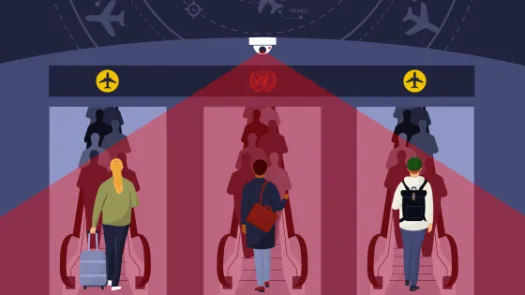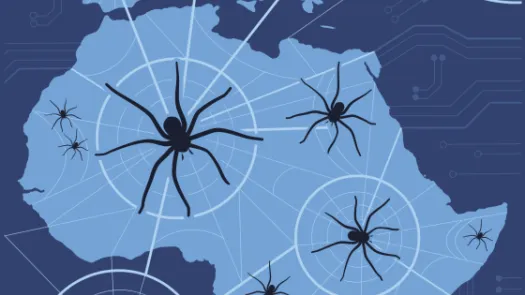Europe’s Shady Funds to Border Forces in the Sahel

Photo by Francesco Bellina
The wars on terror and migration have seen international funders sponsoring numerous border control missions across the Sahel region of Africa. Many of these rely on funds supposed to be reserved for development aid and lack vital transparency safeguards. In the first of a series, freelance journalist Giacomo Zandonini sets the scene from Niger.
Surrounded by a straw-yellow stretch of sand, the immense base of the border control mobile company of Maradi, in southern Niger, is but the latest sign of the growing Western cooperation on security in the Sahel. One that puts together extremely visible - and sometimes contested - military outposts, with a more complex layer of funds and logistical support, with little transparency over their use.
At a corner of the 30 hectares court, apparently too vast for a 250 agents police force, members of one of the three brigades composing the company rest under a thorny acacia tree.
Their neatly pressed uniforms leave no doubt on where the support comes from. On their crests, a skull and two crossed swords overlook a warlike motto: “tuer l’ennemi”, to kill the enemy, it reads. On the sides of the inscription, the Nigerien flag is flanked by a US one.
“Everything we have here, from our clothes to the flatbed cars you can see, comes from the United States,'' says proudly one of the agents, hoping on the other hand that “the EU will do even better.”
FBI’s Gaze Over a Critical Border
Sitting inside a dark room whose walls are covered by maps of this border region, commander Amadou Massaoudou provides with more details.
A jurist with a background on refugee rights and a passion for literature, Massaoudou leads a unit that focuses on contrasting “all forms of trans-border traffic, from clandestine migration to smuggling of all sorts”.
After its launch in mid-2017, in the first eight months of 2018 the company intercepted and delivered to prosecuting authorities about 110 people, including foreigners trying to enter the country irregularly. That was before an emerging security and humanitarian disaster worked its way into this area of Niger from Nigeria, less than twenty kilometers south of the base.
“We’re now dealing with organized criminal groups, based in Nigeria but acting also on our side of the border, mainly through kidnaps from ransom, cattle theft and violent attacks on villagers”, explains Massaoudou.
This out-of-sight crisis forced about 60,000 Nigerians to cross the border into nearby Niger in the span of a few months, in spring 2019, evoking parallelism with the easterly troubled Lake Chad region of Diffa, where hundreds of thousands fled the Boko Haram insurgency, and military operations.
In Maradi, the US funded logistics, maintenance - from the whole structure to 49 vehicles, mostly four wheel drive flatbed - equipment and training. An intense supervision by the US army and the FBI guarantees to overcome difficulties and orientates interventions, says Massaoudou.
If this border force seems to embody Obama’s counterterrorism strategy, axed more on training and advise to security forces in allied countries rather than on direct interventions, the European approach to the Sahel took a migration-driven turn from 2015 onwards, when a political demand for reducing people’s movements from West Africa to Libya, and eventually Italian shores, was matched by growing funds and programmes.
Niger, European Frontier
The US-funded base became a model for further EU support, juxtaposing security concerns with migration control.
Seen as a key migration corridor to Libya, Niger became then the main recipient of an Eu emergency trust fund to tackle the “root causes” of migration, while the little known bloc’s Eucap Sahel Niger mission, one out of 10 Eu civil security missions around the world, multiplied its budget, from about five million euros a year in 2012 to 63 millions for the current two-years period.
As such, Eucap Sahel Niger became the most evident direct EU presence in Niger, with large headquarters in the capital Niamey and a military-looking base in Agadez. Most of its 115 EU effectives are police agents, with a prevalence of French nationals.
Little is known on how their funds are spent, and a 2018 report by the EU Court of auditors emphasized a “limited and slow progress towards achieving their objectives”.
Despite such criticism, a new project is about to see the light. “We are capitalizing on the US experience in Maradi, to build a second border control mobile company in the city of Birni n’Konni,'' explained Benoit Forget, Eucap Sahel Niger’s political advisor.
Forget said that the “same concept of border control mobile companies came from Niger’s president Mahamadou Issoufou, who wanted to strengthen the presence of the State in peripheral areas”. The government adopted a related legal document in late 2016.
The 1500 kilometers long Niger-Nigeria border with its “intense migration movements and criminal activities,'' as the functionary explained, was identified as a key area. This was aligned with the EU's plan to move from disrupting smuggling networks in the north of Niger, along sandy routes to Libya, to controlling entry points in the south.
It’s not a chance if most of the 37,000 citizens of Nigeria who landed on Italian shores in 2016 - the first national group that year - had likely stepped over this border before reaching Agadez, in central Niger, and crossing the Sahara to Libya.
Germany and the Netherlands allocated respectively six and four million euros for the new border control mobile company, with Eucap Sahel Niger acting as the project manager.
According to a German civil servant, “the government of Niger approached several donors to set up four of these companies and the US were the first to react; we came after”. A third company might see the light along the Niger-Burkina Faso border, a once busy migration layover, now touched by militants activity, while a fourth one is in the cards. European funds will be crucial to achieve these results, the official said.
Little Transparency, Local Worries
Privacy International’s requests to access documents detailing the phases of the projects and the type of equipment given to the new company, led so far to the EU Commission releasing only the titles of several reports and agreements while refusing to reveal their content, arguing that “a disclosure of the information [...] would undermine the protection of public security and jeopardize international relations”.
Information we collected portray a 252 police agents unit, whose headquarters in Birni n’Konni, a lively border town halfway between the capital Niamey and Maradi, are being built by the International Organization for Migrations.
A 6-months training period started in march 2019 and - aside from Eucap Sahel Niger - saw the intervention of the German Bundespolizei, the Dutch Marechaussee, the Belgian army, the EU border agency Frontex and the Italy-based European Gendarmerie Force.
Three out of the five sections of the company will be ready to deploy from October 2019 onwards, while the base should be fully operational in August 2020. As in the case of the US sponsored company in Maradi, EU partners in Birni n’Konni will provide with equipment and supervision for an initial three-years period.
Nothing is known on the type of equipment provided by the EU and its member states, but the case of the GAR-SI (Quick Action and Surveillance Groups in the Sahel) shows that this might include drones, night vision equipment and photo cameras.
GAR-SI is a security programme funded through the EU trust fund for Africa, a predominantly development instrument, and aimed at creating gendarmerie units for border control in five Sahelian countries, including Niger, where operations concentrated along the dangerous border with Mali.
A partial release of EU documents on this project, obtained by lawyers from the Italian Associazione Studi Giuridici per l’Immigrazione with Dutch non-profit Profundo, gives a glimpse on GAR-SI’s legal basis and a broad idea of where the EU money went to.
Still, in line with a tradition of scarce transparency on this form of external cooperation, details on the equipment provided to these 120-soldiers units are completely redacted.
Tcherno Hamadou Boulama, a migration expert at civil society organization Alternatives Espace Citoyen, told Privacy International that border control companies are “the latest, dangerous sign that Niger has become an experimental laboratory for the Western securitarian approach to migrations”.
“I’m worried by this kind of answer to mobility in Africa”, Hamadou said, “because it absorbs enormous financial means, while limiting the right to move by local citizens, for whom migration is a key strategy to reduce poverty”. Western partners, he added, “seem more keen to inject funds in these projects, rather than on fighting poverty”.
One of the oldest civil society groups in Niger, Alternatives Espace Citoyen was at the center of a wave of street protests against Issoufou’s government, whose end, in spring 2018 was marked by the arrest of their main organizers, including Alternatives coordinator Moussa Tchangari.
Hamadou is also unquiet over the location of the new border control companies, in an area known for its rigorist Islamic tradition. “It’s easy to wonder whether, with the pretext of migration control, there’s an even more shady plan to increase the surveillance on that stretch of the Niger-Nigeria borderland, gathering data for strategic purposes, rather than looking at the real needs of Nigerien citizens”.



